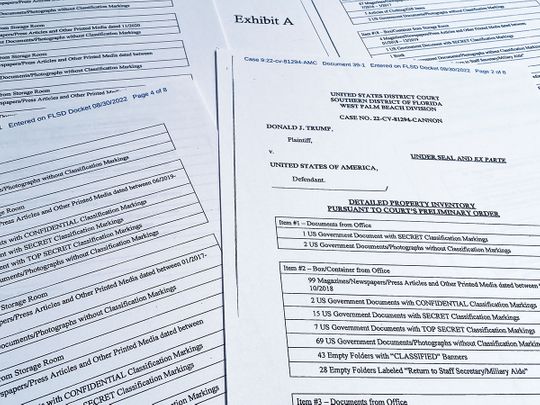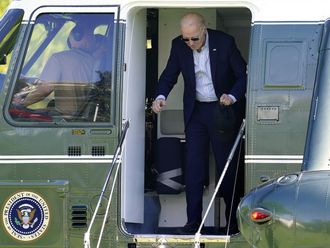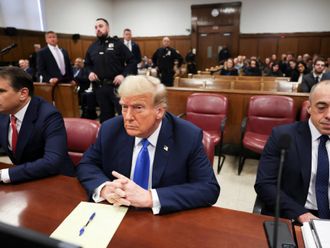
Highlights
- Some of the documents found in Trump's Mar-a-Lago residence were so highly classified.
- Only the president, cabinet or near-cabinet level officials would be cleared to authorise other government officials to access them.
- FBI found intel on foreign govt's nuclear readiness at Trump home, says report.
Washington: One of the classified documents seized by the FBI at former US president Donald Trump's Florida residence described the nuclear capabilities and military defenses of a foreign power, The Washington Post reported Tuesday.
The newspaper, citing unnamed sources familiar with the case, said that some of the documents found in Trump's Mar-a-Lago residence were so highly classified that only the president and cabinet or near-cabinet level officials would be cleared to authorise other government officials to access them.
It did not name the country whose defense and nuclear capabilities were cited in the document.
According to the Post, such documents require special clearances on a need-to-know basis, rather than a generic top-secret clearance.
There were no details as to where in the residence, which also serves as a private members club, the highly sensitive material was found, or under what type of security.
Mounting pressure
Trump is facing mounting legal pressure, with the Justice Department saying top secret documents were "likely concealed" to obstruct an FBI probe into Trump's potential mishandling of classified materials.
When agents searched the Mar-a-Lago resort on August 8, they found material so sensitive that "even the FBI counterintelligence personnel and DOJ attorneys conducting the review required additional clearances before they were permitted to review certain documents," a government court filing said.
184 'confidential' documents
The FBI raid came after a review of "highly classified" records that Trump finally surrendered to authorities in January after months of back and forth with the National Archives and Records Administration.
The 15 boxes handed over by Trump were found to contain 184 documents marked as confidential, secret or top secret.
After prompting from the FBI, Trump's lawyer eventually turned over an additional 38 classified documents, and provided "sworn certification" that they represented the last of the material.
But the FBI went on to uncover "multiple sources of evidence" showing classified documents remained at Mar-a-Lago.
10,000 government records
FBI agents who searched former President Donald Trump's Florida home last month found top secret records in an office and storage room, along with empty folders with classified banners on them and more than 10,000 government records without any classification markings at all, according to a more detailed inventory of the seized material made public on Friday.
The inventory disclosed by the Justice Department reveals in general terms the contents of 33 boxes and containers taken from an office and a storage room at Mar-a-Lago during the Aug. 8 search.
Though the inventory does not describe the content of the documents, it shows the extent to which classified information, including material at the top-secret level, was stashed in boxes at the home and commingled among newspapers, magazines, clothing and other personal items.
It also makes clear for the first time the volume of unclassified government documents maintained at the home even though such records were to have been turned over to the National Archives and Records Administration, which had tried unsuccessfully for months to secure their return.
The Justice Department has said there was no secure space at Mar-a-Lago for sensitive government secrets, and has opened a criminal investigation focused on their retention there and on what it says were efforts in the last several months to obstruct that probe.
It is also investigating potential violations of a separate statute that criminalises the mutilation or concealment of government records, classified or not.
The inventory was released as the Justice Department undertakes a criminal investigation, as intelligence agencies assess any potential damage caused by the apparent mishandling of the classified information and as a judge weighs whether to appoint a special master, essentially an outside legal expert, to review the records.












